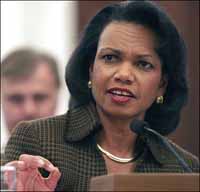Rice says U.S. making progress in terror fight despite Iraq violence
Secretary of State Condoleezza Rice claimed "considerable progress" in the global fight against terrorism as she prepared to ask skeptical Arab governments to do more and to underwrite democracy in Iraq.

"There's been some real progress on some fronts and in other places the terrorists have continued to challenge democratic governments," Rice said Tuesday when asked about a State Department report showing terrorist attacks worldwide shot up more than 25 percent last year.
"We'll continue to fight that war. We're making considerable progress," Rice said.
The report Monday said terrorists killed 40 percent more people in 2006 than in 2005, particularly in Iraq where extremists used chemical weapons and suicide bombers to target crowds.
The grim findings on violence in Iraq are expected to underscore the difficulty for Rice as she heads to Egypt for meetings later this week with Iraq's Arab and Iranian neighbors and outside backers.
Arab states have been reluctant to contribute substantial financial or diplomatic help to Iraq, largely because Sunni-led states dislike or distrust the U.S.-backed, Shiite-led government in Baghdad. Many Arab diplomats also say they doubt Iraq can stave off a civil war they want no part of.
The challenge for Iraq's Western backers is to convince neighboring states that they have more to lose from a failed Iraq than they risk by engaging now.
"The neighbors in particular, I think have a very important role to play," the U.S. ambassador in Baghdad, Ryan Crocker, told reporters Tuesday. "They can play it for better or worse in bringing about stability to Iraq."
The United States wants to see new promises of support if not specific financial pledges. More than four years after the U.S.-led invasion, the United States is shouldering most of the military, financial and diplomatic burden in Iraq, where democratic gains have been partly eclipsed by a tide of killings and chaos that Iraqi and U.S. forces have been unable to contain.
U.S. goals for back-to-back international meetings about Iraq's future have been overshadowed by the question of whether the Bush administration will use the sessions to expand tentative contacts with Iran and Syria, regimes it has shunned and blamed for sowing terrorism in Iraq and beyond. Rice has said she will not rule out sideline talks with Iranian and Syrian diplomats, but U.S. officials have tried to lower expectations for any potential discussions.
Lower-level U.S. diplomats had brief face-to-face meetings with counterparts from Iran and Syria during a similar Iraq-themed conference in Baghdad in March. Rice's involvement would represent a significant and potentially risky increase in U.S. willingness to talk to Iran, in particular.
Ending the diplomatic isolation of Iran and Syria was a key recommendation of last year's report by the bipartisan Iraq Study Group, but the Bush administration initially resisted. Until recently, Rice had said those nations knew what they should do to help in Iraq and did not need U.S. encouragement. U.S. officials also said the price of negotiation would be too high, because Syria and Iran would use contact with the U.S. as leverage in unrelated diplomatic negotiations.
The first of two sessions in the Egyptian resort of Sharm el-Sheikh was scheduled Thursday to endorse the International Compact with Iraq, a five-year plan that would promise Iraq financial and political support as it meets targets for political and economic reform. On Friday, Iraq's near neighbors plus the United States and other backers will discuss strategies to lessen violence and improve political stability in Iraq.
The United States will also participate in an informal gathering of Arab states and international Mideast peacemakers from the United Nations, Europe and Russia.
Subscribe to Pravda.Ru Telegram channel, Facebook, RSS!


